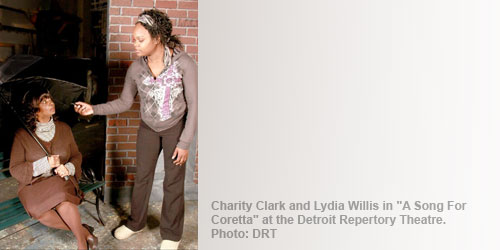By D. A. Blackburn

With Martin Luther King Jr. Day on the post-weekend horizon, it seemed entirely fitting that the Detroit Repertory Theatre would choose to open "A Song For Coretta" Thursday night.
The play, however, packs a jarring surprise, delivering a startling message about the cultural impact of an American icon.
"A Song For Coretta" was written by Pearl Cleage, an artist with significant ties to Detroit and to the civil rights movement that made the work's title figure a household name. Fittingly, the work made its premiere in Atlanta in 2007, but it's no stranger to Detroit-area audiences, having previously been staged at the Charles H. Wright Museum in the city's cultural center. The DRT's production, though, is almost entirely fresh – with just one hold-over in casting from the Wright production.
The work is set against the backdrop of Atlanta's Ebenezer Baptist Church on the day of Coretta Scott King's funeral. As was the reality of the occasion, an immense crowd has gathered to mourn. The play picks up late in the evening, on a rain-drenched sidewalk where the last of the mourners are waiting to pay their respects to a woman whose influence has been as unique for each as it has been lasting.
The play's basic premise – a clash-turned-sisterhood of five African-American women of very different backgrounds – is sound, if a bit predictable. And ultimately, all five characters come off in essentially the same way – likable and easily relatable caricatures of various social and economic classes.
The first act of "A Song For Coretta" introduces four characters: Helen Richards (Charity Clark), a widowed veteran of the Montgomery bus boycott; Zora Evans (Lydia Willis), a college student and aspiring journalist hoping to make her big break with a story about the funeral; Mona Lisa Martin (Angela G. King), a struggling portrait artist and hurricane Katrina survivor; and Keisha Cameron (Casaundra Freeman), a pregnant urban high school student with a standoffish attitude.
Tight direction by Barbara Busby helps to make this unlikely grouping feel entirely natural, imbuing characters with a perfect level of reserve, allowing them to blossom slowly, steadily throughout the act.
Opening night the cast performed with the confidence of a well-rehearsed ensemble, delivering Cleage's conversational dialogue precisely, but with a natural ease. If characters showed any signs of underdevelopment, they lied in regional accents, which were present but perhaps less evident than could be desired.
In all other respects, the cast proved a fine ensemble, delivering the script's humor and, more importantly, its message about Coretta Scott King's legacy with grace.
Clark and Freeman, particularly, give stand-out performances. Willis' Zora seemed, initially, a bit overly exuberant, which made the character feel a bit contrived, but as the play unfolded she found a more realistic balance. This initial impression is likely more a result of direction – an aggressive blocking and excited delivery of dialogue – than Willis' acting.
As the curtain closed on the first act, "A Song For Coretta" seemed an easy hit, but the second act had a decidedly chilling effect for this critic. With the introduction of a fifth character – Gwen Johnson (Janee Ann Smith), a disillusioned Iraq war veteran – the play builds to a surprising climax, effectively terminating the comfortably predictable tone of the work.
The apex of Cleage's script comes with a unique (for lack of a better term) "shared monologue" by Mona Lisa Martin and Gwen Johnson, which simultaneously depicts the horrors of war and the post-Katrina disaster at the Super Dome with a jarring patter. Even structurally, it is an affront to the smooth, fluid motion of the play's dialogue. The scene stops short of making a political statement, intended rather, to illustrate a quest for redemption through Coretta's influence. If this sounds odd, it is. And, in many ways, it derails an elegant message of empowerment that seems firmly on-track throughout the first act.
"A Song For Coretta" may fall short for this unusual diversion, but the first act makes for incredibly satisfying theater. And ultimately, it does succeed in expressing the range of influence that King has had on the American consciousness.
One can only wish that Cleage could have delivered her message with a bit better dramatic balance.
REVIEW:
'A Song For Coretta'
Detroit Repertory Theatre, 13103 Woodrow Wilson, Detroit. Thursday-Sunday through March 21. $17-$20. 313-868-1347. http://www.detroitreptheatre.com










